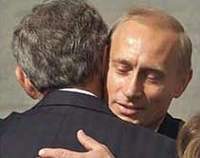US administration balances between love for Putin and democracy
The Washington Post has recently published quite a curious article. It deals with opinions by members of the Bush Administration on U.S. foreign policy priorities with regard to Russia. The article says that many high-ranking government officials including Vice-President Richard B. Cheney call for a tougher stance on Russia due to its domestic policy featuring disregard of democratic principles while unacceptable methods of pressure are used by the Russian government as the foundation for pursuing a foreign policy with respect to Russia’s neighbors. Meanwhile, U.S. Secretary of State Condoleezza Rice represents the other faction within the U.S. Administration, which insists that U.S.-Russia relations be based on a “pragmatic partnership.” The newspaper quotes a high-ranking official who asserted that “now there’s tension in the Administration between those who love Putin and those who love democracy. The president and Condi seem to be balancing between those two groups.” In the meantime, Rice said that nowadays the U.S. and Russia have “arguably the best relations over the long period of time.” Rice condemned the new law on NGOs recently enacted by Russian Parliament. She also acknowledged the problem caused by “economic pressure” put by Russia on Ukraine. However, Rice said that the United States should look at the issue from a different angle. “Here are the alternatives: We can declare that things are not going well in Russia, and therefore we’ll have to get back to the past and keep the Russians isolated from such bodies as the Russia-NATO Council and G8. But we can also keep sending the message to the Russian: ‘We do want you on board those organizations but we also expect you to play by the rules set by those organizations’,” said Rice.

On the other hand, Vice-President Dick Cheney instructed John Negroponte, the Director of National Intelligence, to prepare documents pertaining to U.S.-Russia relations. During recent hearings in the U.S. Senate committee, Negroponte unveiled a report on main threats to the U.S. national security. The document maintains that “power tends to centralize in the hands of the government, which also aims to assume control over the civil society and strategic sectors of the economy… combined with widespread corruption.” The document also says that “the Kremlin feels more confident now thanks to high profits from oil and gas exports, and purportedly successful domestic and foreign policy.” According to Negroponte, within the next few years Russia may put more stress on tackling domestic issues. Russia may become an unyielding negotiator for the United States, said Negroponte.
The United States is supposedly pondering ways to pursue its foreign policy towards Russia. However, despite some belligerent statements by opponents of U.S.-Russia cooperation, America is likely to embrace the Rice plane i.e. U.S. is expected to count Russia in a variety of joint projects while putting pressure on the Kremlin to ensure democracy.
Aside from promoting democracy in Russia, the United States is also going encourage democratic processes in other republics of the former Soviet Union. U.S. Congress should pass “Democracy and Human Rights Act in Central Asia.” The bill concerns five states of Central Asia: Kazakhstan, Kyrgyzstan, Uzbekistan, Tajikistan, and Turkmenistan. The bill provides for the allocation of $188 million in the next few years for a number of programs. The amount of financial, economic, and military aid to Central Asian states hinges on progress to be achieved by the above states in the area of democratic reforms. A lack of progress will reduce aid by 33% during the first year, no progress on the following year will cut aid by 66%, and status quo for the third year will put the plug on the U.S. aid.
It is unlikely that the U.S. will succeed in democratization of Turkmenistan where all political life is brutally suppressed by the Turkmenbashi regime. Besides, political elites of other Central Asian states are not keen to see any democratic changes undermine their grip on power.
The results of an opinion poll commissioned by CBS were revealed on the last day of February. The poll indicates that Bush’s rating plummeted to a record low of 34%. According to the survey, 50% of the Americans are unhappy about the way Bush conducts the war on terror. The White House policy in Iraq is approved by 65% of the respondents while 30% support it. The economic course of the Administration is disapproved by 65% of the respondents while 32% believe the U.S. economy is doing fine. Cheney’s rating is even lower, a mere 18% of the respondents express a positive attitude to the vice-president.
The Bush Administration does not seem to know how to get a facelift in terms of public opinion at home. Top government officials had better give it a thought or two but they are constantly busy handling global issues e.g. spreading democracy all over the world. The task is extremely time-consuming so George W. Bush has no time to decide on a direction of U.S-Russia cooperation. “The U.S. government knows something has to be done, but they do not know yet what exactly should be done,” as an American expert put it.
Utro
Translated by Guerman Grachev
Subscribe to Pravda.Ru Telegram channel, Facebook, RSS!


